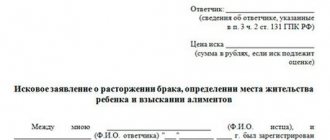What the law says
The RF IC (Article 94) states that grandparents are required to pay child support if the minor does not receive sufficient support from the parents. In other words, if a child does not have enough financial support from his mother or father, the law can recover money from their parents.
According to the RF IC, grandparents are required to support not only children under 18 years of age, but also older grandchildren (provided they are recognized as disabled). Collection occurs if it is not possible to obtain funds from parents or other family members.
Free consultation with a lawyer on alimony from grandparents>>
Responsibilities of grandparents for the maintenance of grandchildren
Legal regulation is carried out on the basis of Art. 94 RF IC. The article provides for the conditions governing the procedure for obtaining means of further subsistence.
It is also indicated that assistance is provided not only to grandchildren who have not yet turned 18 years old. Additionally, relationships with disabled members of society are discussed. Subject to confirmation of this fact by certificates issued by the relevant commission.
The claim is allowed to be filed in the absence of proper funding from the parents. The court will determine the amount and schedule of transfers.
Grounds for assigning payments
The decision to collect alimony from grandparents is made by the court if there are grounds for it. These include:
- Death of parents when a relative of one of them acts as a guardian.
- Relatives belonging to the 1st stage have not reached 18 years of age and cannot support a child.
- Mother and father refuse to pay child support.
- The recipient of alimony payments is disabled.
- The money provided by the parents is not enough to support the minor.
The above are common cases, but they are usually associated with other reasons. For example, the alimony debtor may have a low level of earnings, or he is wanted. Each situation is considered individually.
Conditions when you can apply for alimony from your grandparents
In certain situations, the mother can recover money from the parents of her husband/ex-husband to support the child. Among them:
- death of a parent;
- declaring the alimony provider dead;
- half-brothers and half-sisters cannot financially support the child;
- the father is in prison;
- The parent obligated for child support maliciously avoids making payments.
Collection of financial security is possible only if the grandparents have the financial capacity to make payments. Incapacity for work is not a sufficient basis for refusal to assign payments.
It is possible to withhold payments for a grandchild if the payers:
- have official employment;
- receive a pension that significantly exceeds the subsistence level;
- have additional income (rent apartments, have land shares, shares, securities).
If a woman has filed a demand to collect funds from her husband’s mother, the court has the right to divide the responsibility for making payments between the mother and father of the child’s father. Grandparents, on the one hand, are jointly and severally liable.
The right to demand monetary support is vested in the legal representative of a minor or an adult child in the event of his incapacity for work.
Legislatively, the procedure for receiving alimony in favor of grandchildren from grandparents is regulated by Art. 94 RF IC.
How much can I charge?
Many questions concern the amount of child support. In the “dry” theory, the amount of payments depends on the number of minors. For one child 25% is paid, for two - 33%, and for three or more - 50%. This approach is relevant for working spouses who are obliged to take care of their child. In the case of grandparents, other factors are taken into account:
- the cost of living in the region
- pension amount
- the fact that there are other sources of profit, etc.
For example, if a grandfather receives 15,000 rubles a month in pension, and the cost of living in the region is 13,500 rubles, only 1,500 rubles will be allocated for the child. The court does not have the right to recover a large amount, because then the rights of the pensioner will be violated. When considering a case in court, all available sources of income are taken into account, and not just the amount of pension benefits.
Can I file child support while married if my husband has other child support obligations?
Good afternoon. Can I file child support while married if my husband has other child support obligations?
Lawyer Antonov A.P.
Good afternoon
According to Articles 80-84 of the Family Code, parents are obliged to support their minor children. The procedure and form for providing maintenance to minor children are determined by the parents independently. Parents have the right to enter into an agreement on the maintenance of their minor children (agreement on the payment of alimony) in accordance with Chapter 16 of this Code. If parents do not provide maintenance to their minor children, funds for the maintenance of minor children (alimony) are collected from the parents in court. In the absence of an agreement between the parents on the payment of alimony, in the absence of provision of maintenance to minor children and in the failure to file a claim in court, the guardianship and trusteeship authority has the right to file a claim for the recovery of alimony for minor children against their parents (one of them). In the absence of an agreement on the payment of alimony, alimony for minor children is collected by the court from their parents monthly in the amount of: for one child - one quarter, for two children - one third, for three or more children - half of the earnings and (or) other income of the parents. The size of these shares may be reduced or increased by the court, taking into account the financial or family status of the parties and other noteworthy circumstances. The types of earnings and (or) other income that parents receive in rubles and (or) in foreign currency and from which alimony is withheld for minor children in accordance with Article 81 of this Code are determined by the Government of the Russian Federation. For income that cannot be levied, see Federal Law No. 229-FZ of October 2, 2007 “On Enforcement Proceedings” In the absence of an agreement between the parents on the payment of alimony for minor children and in cases where the parent is obliged to pay alimony , has irregular, variable earnings and (or) other income, or if this parent receives earnings and (or) other income fully or partially in kind or in foreign currency, or if he has no earnings and (or) other income, as well as in other cases, if the collection of alimony in proportion to the earnings and (or) other income of the parent is impossible, difficult or significantly violates the interests of one of the parties, the court has the right to determine the amount of alimony collected monthly, in a fixed sum of money or simultaneously in shares (in accordance with with Article 81 of this Code) and in a fixed amount of money. The amount of a fixed sum of money is determined by the court based on the maximum possible preservation of the child’s previous level of support, taking into account the financial and marital status of the parties and other noteworthy circumstances. If there are children with each of the parents, the amount of alimony from one of the parents in favor of the other, less wealthy one, is determined in a fixed sum of money, collected monthly and determined by the court in accordance with paragraph 2 of this article. For children left without parental care, alimony is collected in accordance with Articles 81 - 83 of this Code and is paid to the guardian (trustee) of the children or their adoptive parents. Alimony collected from parents for children left without parental care and located in educational organizations, medical organizations, social service organizations and similar organizations is credited to the accounts of these organizations, where they are accounted for separately for each child. These organizations have the right to deposit these amounts in banks. Fifty percent of the income from the circulation of received amounts of alimony is used to support children in the specified organizations. When a child leaves such an organization, the amount of alimony received for him and fifty percent of the income from their circulation are credited to an account or accounts opened in the name of the child in a bank or banks, provided that the specified funds, including capitalized (accrued) interest on their amount, are insured in the system of compulsory deposit insurance in banks of the Russian Federation and the total amount of funds held in an account or accounts in one bank does not exceed the amount of compensation provided for by Federal Law of December 23, 2003 N 177-FZ “On insurance of deposits in banks of the Russian Federation” by deposits. Thus, the obligation to pay child support itself does not depend on whether the person has other children.
Sincerely, lawyer Anatoly Antonov, managing partner of the law firm Antonov and Partners.
Still have questions for your lawyer? Ask them right now here, or call us by phone in Moscow +7 (499) 288-34-32 or in Samara +7 (846) 212-99-71 (24 hours a day), or come to our office for a consultation (by pre-registration)!
The process of collecting alimony
The decision to transfer funds to grandchildren is made by the court. The plaintiff may be a mother/father, a guardian/trustee, a disabled child or guardianship authorities. According to the law, the collection of alimony is impossible if a minor is left without parents, because in this case, monthly payments are provided by the state.
What you need
To go to court, you must file a claim and submit it to the office for review. Representatives of the judicial authority consider the appeal and the possibility of collecting money on an individual basis. When filling out the document, the requirements of the Code of Civil Procedure of the Russian Federation are taken into account (Articles 131 and 132). If you deviate from the current standards, no one will consider the application.
The claim includes the following information:
- court details (name, address)
- information about the plaintiff (full name, passport data, registration address, telephone number)
- title of the statement of claim
- description of the reasons explaining the need to collect alimony payments from grandparents)
- an indication of the inability to independently fulfill obligations and an indication of the reasons
- references to the norms of the laws of the Russian Federation explaining the position
- requirement to ensure the transfer of a certain amount necessary for the child
- application inventory
- date and signature
The main attributes of the statement of claim are presented above, but in each specific case the content of the document is individual. If you have no experience in filing a claim, it is better to hire a lawyer. He will help you compose and make the right accents.
Required documents
A claim for alimony must be supported by a package of documents. It includes:
- Applicant's passport and child's certificate.
- Information about the second parent. Depending on the circumstances, this may be a decision by a judicial authority to declare him dead, a court verdict, refusal to pay alimony, etc.
- Information about other relatives. If available, documents are attached confirming the impossibility of financially supporting the minor.
- Information about the plaintiff’s level of earnings.
- Information about the child's needs.
- Confirmation of the costs of maintaining a disabled person (if such a fact exists). This includes bills for treatment, purchase of medicines and other expenses.
The list of required documents may be adjusted depending on the circumstances and requirements of the court.
Step by Step Actions
Filing a lawsuit to collect alimony from grandparents is the right of the mother or father of the child. The general algorithm of actions looks like this:
- Filing a claim taking into account the rules stated above.
- Collection of documents.
- Transfer of the statement of claim and documentation to the court.
- Awaiting notification of the date and time of the first trial.
- Participation in the process.
- Obtaining a decision from a judicial authority.
- Submitting the resolution to the FSSP so that the bailiffs begin collecting alimony.
The statement of claim is submitted by direct transmission to the office or by sending a letter.
What is the impossibility of paying child support by parents?
Judicial practice has established several of the most common conditions that clearly indicate the impossibility of paying child support by one or two parents. Among them:
- Group 1 or 2 disability of one or both parents;
- Being in prison for a long term;
- Unknown absence, death of a parent.
Evasion from paying alimony cannot be a basis for collecting funds from a grandfather or grandmother.
In any case, each case will require a thorough review by a lawyer. In fact, the mechanism for collecting alimony from grandparents in favor of grandchildren in the Russian Federation almost does not work. The exception is truly wealthy relatives who can pay alimony without harming their financial situation.
Types of establishing alimony
According to the law, alimony can be collected in two ways - through an agreement or through the court. The best solution is a voluntary agreement indicating the amount and procedure for transferring alimony. The contract must contain the following information:
- payer and recipient data
- information about a minor or disabled person
- timing and frequency of payment of funds
- rights and obligations of the parties
- conditions for making amendments to the agreement
- the amount of the penalty in case of violation of the conditions
- day of registration and signature
The document passes through a notary, because otherwise it has no force. In the future, the parties to the agreement have the right to make changes to the document an unlimited number of times. The main thing is that the parties approve these amendments.
If interested parties cannot agree on the issue of alimony amicably, a claim is filed in court. The latter is selected according to the residential address of either party. Each situation is analyzed individually. If grandparents only receive a pension, the process of collecting alimony is more complicated.
Question answer
In a situation related to the collection of alimony, clarification can be obtained from real questions and answers. Here are a few of them:
- “I live on a pension and pay off my mortgage until 2025. Can they collect money from me to support my granddaughter?” According to the RF IC (Article 94), grandparents, if appropriate circumstances exist, must help their grandchildren. The final decision is always made by the court.
- “My husband died three months ago. He has accumulated more than 30,000 in alimony debt. Can I get them from my grandparents? In such matters, what matters is whether the parents inherit their son's debt.
- “What income is taken into account when determining the amount of alimony that is taken for a grandchild without parents?” By law, the calculation takes into account all income that can be proven.
Each case is individual, but the consideration takes into account the position of current laws and judicial practice.
Is it possible to transfer alimony debt by inheritance?
Yes, you can, but taking into account one feature.
As a general rule, obligations to pay child support are inextricably linked with the personality of the debtor, therefore they are not inherited and terminate at the moment of his death.
But the alimony debt, based on a court decision and not paid by the debtor during his lifetime,
ceases to be an obligation associated with the personality of the testator, and becomes an unfulfilled monetary obligation, which is included in the estate and is inherited along with other property of the debtor on a general basis.
Thus, the alimony debt based on a court decision passes to the heirs, and the latter will be required to pay it within the value of the inherited property transferred to them. This position was voiced in the Determination of the Judicial Collegium for Civil Cases of the Supreme Court of the Russian Federation dated March 1, 2016 N 45-KG 16-1.
That's all. If the article was useful, I suggest discussing it.
Case studies
For a better understanding, we present several real cases from judicial practice.
Case No. 1. Petrova A.A. has three children, one of whom has a disability. The woman's husband is in prison and is not helping the child enough. Petrova filed a lawsuit demanding to recover money from her husband’s parents for the maintenance of a disabled person. The judicial authority found that there was no need to collect alimony from the grandparents, because the father works in prison and sends small amounts.
Case No. 2. Ivanova A.E. filed a lawsuit and demanded to collect alimony payments from the grandfather due to the fact that the child’s father is incompetent and cannot provide a normal level. The woman noted that the grandfather has sufficient income and leads a secular lifestyle. The court partially granted the mother's request and ordered a payment of 6,000 rubles per month.
As a rule, the plaintiffs are parents (mother or father) who do not have enough funds to support the minor. At the same time, there is no uniform judicial practice in this matter - each case is individual.
Arbitrage practice
It is very difficult to collect alimony from a grandfather or grandmother for a grandson or granddaughter. In most cases, courts refuse to satisfy such demands, here are some examples:
- The plaintiff has a child from her deceased husband. She tried to collect alimony from his parents, guided by the fact that after the death of her husband they received their share of the inheritance, and now she lives on a survivor’s pension; there is not enough money to support the child. By decision No. 2-250/2016 2-250/2016~M-267/2016 M-267/2016 dated April 25, 2021 in case No. 2-250/2016, the claims were denied: the plaintiff has the opportunity to work, but did not undertake attempts to find a job, and the collection of alimony from the defendants will have an extremely negative impact on their well-being.
- The couple had a son during their marriage, then they divorced. The woman decided to demand alimony from her ex-husband’s parents, citing the fact that the payments established by the court from the father were not enough to support the child. Decision No. 2-103/2020 2-103/2020(2-1177/2019;)~M-1110/2019 2-1177/2019 M-1110/2019 dated January 17, 2021 in case No. 2-103/2020 the demands were denied: both parents have the opportunity to work and support their son, and, moreover, alimony was previously collected from the man by court decision. There are no grounds for recovery from grandparents.
There is an interesting review of judicial practice in cases related to the collection of alimony for minor children, as well as for disabled adult children (approved by the Presidium of the Supreme Court of the Russian Federation on May 13, 2015). Section V confirms that it is indeed very difficult to collect child support from a grandparent.
Results
According to current legislation, the situation when a grandmother or grandfather pays alimony for a grandchild is real. This norm is stipulated by the RF IC (Article 94). When analyzing the situation, the court takes into account many factors, ranging from the applicant’s financial situation to the income of pensioners and other circumstances of the case. In this case, the decision can be made both in favor of the plaintiff and in favor of the defendant. Sometimes the court partially covers the applicant’s requests, but here everything depends on the documents provided and the basis for the claim. That is why, to achieve results in such matters, it is better to engage a competent lawyer.
When they can refuse
Most often, requests are denied. As can be seen from judicial practice, refusal is possible in the following cases:
- mother or father is alive;
- both parents are able to work and are able to independently provide for the minor;
- mother or father do not work for unjustified reasons;
- one of the parents has fallen behind on child support;
- the payer does not have enough funds;
- a child over 18 years of age does not need financial support.
In fact, pensioners rarely have enough money to provide for their children. Therefore, the mechanism for collecting alimony payments from relatives does not work properly.











